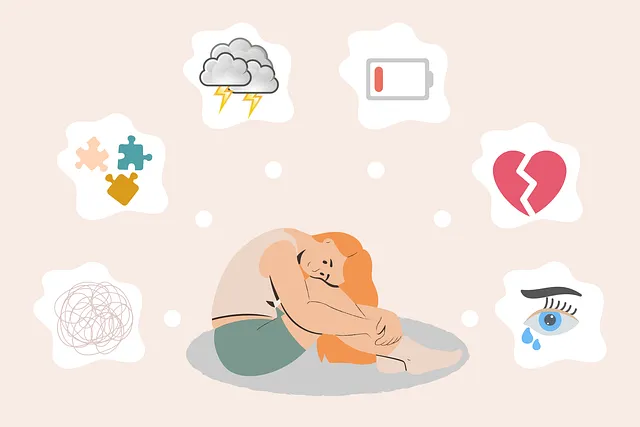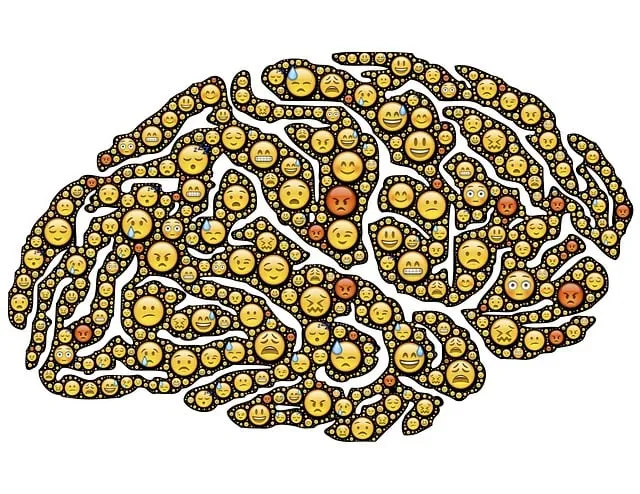The Kaiser Permanente mental health facility in Centennial prioritizes early depression recognition, addressing complex symptoms and risk factors like genetic predisposition, chronic illness, trauma, and burnout. They promote holistic well-being through lifestyle changes (physical activity, balanced diet, sleep), compassion cultivation practices, social skills training, and emotional regulation techniques. Building resilience through self-care, stress management, and social connections is key, with programs designed to empower individuals in managing mental health proactively. The facility offers a comprehensive suite of services including CBT, mindfulness, support groups, crisis intervention, and conflict resolution to prevent depressive episodes.
Depression is a prevalent yet complex condition, but with the right strategies, it can be prevented or managed effectively. This comprehensive guide, inspired by the holistic approach of the Kaiser Permanente mental health facility in Centennial, offers valuable insights into depression prevention. From understanding early symptoms and risk factors to exploring lifestyle changes, building resilience, fostering social connections, and navigating professional help, each section equips readers with practical tools to safeguard their mental well-being.
- Understanding Depression: Symptoms and Risk Factors (Focus on early recognition at Kaiser Permanente mental health facility Centennial)
- Lifestyle Changes for Improved Mental Well-being (Highlighting preventive measures inspired by Kaiser Permanente's holistic approach)
- Building Resilience: Coping Strategies and Stress Management (Practical tips from the experts at Kaiser Permanente mental health facility)
- Social Connections and Support Networks (Emphasizing the importance of relationships in depression prevention)
- Professional Help and Treatment Options (Navigating Kaiser Permanente's services for proactive mental health care)
Understanding Depression: Symptoms and Risk Factors (Focus on early recognition at Kaiser Permanente mental health facility Centennial)

At Kaiser Permanente mental health facility Centennial, recognizing depression early is a cornerstone of their comprehensive care approach. Depression, often misunderstood, manifests through various symptoms like persistent sadness, loss of interest in activities once enjoyed, changes in appetite and sleep patterns, fatigue, difficulty concentrating, and feelings of worthlessness or guilt. Recognizing these signs is crucial, as early intervention can significantly improve outcomes.
Risk factors for depression are multifaceted, including genetic predisposition, chronic illnesses, traumatic life events, and even burnout from high-pressure professions like healthcare. For healthcare providers, such as those at Kaiser Permanente mental health facility Centennial, understanding these risk factors is essential given their exposure to intense emotional demands. Implementing effective burnout prevention strategies, like Compassion Cultivation Practices, alongside promoting mental wellness, can help mitigate risks and foster a healthier work environment that supports both professionals and patients.
Lifestyle Changes for Improved Mental Well-being (Highlighting preventive measures inspired by Kaiser Permanente's holistic approach)

At Kaiser Permanente mental health facility Centennial, a holistic approach to depression prevention emphasizes lifestyle changes that promote overall well-being. This includes adopting healthy habits such as regular physical activity, a balanced diet, and sufficient sleep – foundational elements that can significantly influence mental health. By incorporating these practices, individuals not only strengthen their bodies but also create a stable foundation for managing stress and maintaining positive emotional states.
In addition to physiological changes, Kaiser Permanente’s holistic strategy incorporates compassionate cultivation practices, social skills training, and emotional regulation techniques. These strategies aim to foster deeper connections with others, enhance communication skills, and develop effective coping mechanisms for navigating life’s challenges. By integrating these preventive measures, individuals are empowered to take proactive steps towards mental wellness, reducing the risk of depression and fostering a more resilient mindset.
Building Resilience: Coping Strategies and Stress Management (Practical tips from the experts at Kaiser Permanente mental health facility)

Building resilience is a key component of depression prevention, according to experts at Kaiser Permanente mental health facility in Centennial. By cultivating coping strategies and implementing effective stress management techniques, individuals can fortify their mental well-being and better navigate life’s challenges. The facility recommends prioritizing self-care practices such as regular exercise, adequate sleep, and mindfulness meditation to reduce stress levels and enhance emotional balance.
Furthermore, the Kaiser Permanente team emphasizes the importance of social skills training in preventing burnout. Fostering meaningful connections and maintaining a strong support network can provide individuals with a sense of belonging and purpose. By combining self-care practices and social engagement, people can build a robust foundation for mental health that is less susceptible to depressive episodes. These strategies are backed by research and offered through various programs at the Kaiser Permanente mental health facility in Centennial, designed to empower individuals on their path to holistic well-being.
Social Connections and Support Networks (Emphasizing the importance of relationships in depression prevention)

Building and maintaining strong social connections is an often-overlooked yet powerful tool in depression prevention. At a Kaiser Permanente mental health facility like the one in Centennial, experts emphasize that relationships can significantly impact our emotional well-being. The support of friends, family, or even community groups can provide a sense of belonging and purpose, acting as a protective buffer against the onset of depression. These connections offer opportunities for sharing experiences, providing comfort during difficult times, and celebrating life’s joys, all of which contribute to better mood management.
Nurturing these relationships is key in burnout prevention. Engaging in open communication, spending quality time together, and offering both emotional and practical support can strengthen bonds. Activities that foster camaraderie, such as group outings or shared hobbies, can create lasting memories and cultivate a sense of connection. By prioritizing social interactions, individuals can build resilience against life’s challenges, enhancing their overall mental health and reducing the risk of depression.
Professional Help and Treatment Options (Navigating Kaiser Permanente's services for proactive mental health care)

For those seeking proactive mental health care, Kaiser Permanente Centennial offers a comprehensive suite of services designed to support and enhance well-being. Their dedicated mental health facilities provide a safe space for individuals to navigate depression and anxiety through evidence-based treatments. Professionals at Kaiser Permanente are equipped with the latest techniques in cognitive behavioral therapy (CBT), mindfulness practices, and other therapeutic approaches tailored to individual needs.
In addition to individual therapy sessions, Kaiser Permanente’s services include support groups, crisis intervention guidance, and programs focused on coping skills development and conflict resolution techniques. These holistic offerings empower individuals to build resilience, manage stress effectively, and cultivate healthier relationships—all crucial elements in preventing and managing depressive episodes.
Depression is a preventable condition, as highlighted by the comprehensive strategies offered at the Kaiser Permanente mental health facility Centennial. By understanding early symptoms and risk factors, adopting lifestyle changes that promote holistic well-being, building resilience through effective coping mechanisms, fostering strong social connections, and seeking professional help when needed, individuals can effectively navigate and prevent depression. The integrated approach of the Kaiser Permanente mental health facility serves as a valuable model for proactive mental health care, empowering folks to recognize and address potential issues before they escalate.






